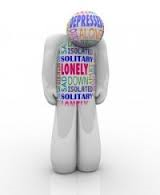Depressed Mood
How can you tell depression from simple sadness? If you're feeling down because of a specific event, such as losing a job or the breakup of a relationship, it could be normal and temporary sadness. If you feel sad, despairing, teary, or "empty" every day for more than two weeks and it's interfering with other aspects of your life, it may be clinical depression.
Breaking Plans, Withdrawing Socially
Do you avoid leaving the house? Does making conversation feel like too much effort? Do you retreat to your bed when family members try to draw you out? Maintaining a strong social network is important. Losing pleasure in activities can indicate feelings of depression. It may help to join a support group of people who understand what you're going through.
Sleeping Too Much or Too Little
A change in your sleeping habit such as insomnia -- trouble falling or staying asleep -- could be a sign of depression. It can cause or aggravate other symptoms that may also indicate depression, such as fatigue. If you regularly lie awake at night with your mind racing or sleep too much to avoid getting out of bed, speak to your doctor. If your sleep problems are a symptom of depression relapse, medication and talk therapy may help.
Irritability
Lately you've found it difficult to handle everyday stresses. Small things make you snap. You constantly bicker with friends and family. Where you used to be easygoing, you now have violent outbursts. Depression can show itself in irritability and anger. Men are more likely than women to behave recklessly and, sometimes, violently when they are depressed.
Loss of Interest in Sex and Other Pleasures
This is one of the most common signs of depression. Activities you used to enjoy may now feel like a burden. If you've had depression in the past and have lost feelings for your spouse or children, or lost interest in work, hobbies, or other favorite activities for more than two weeks, could you be relapsing? Ask your doctor for help. Symptoms recurring within a year put you at risk of a depression relapse.
Feeling Worthless
Old feelings of self-loathing and guilt may come creeping back. Or you may be unable to "turn off" self-criticism, preoccupied with your failures. You may feel responsible for events that are out of your control. Psychotherapy may help you with low self-esteem and learn to build on your strengths. If you are living with depression and have attempted suicide, you may have a higher risk of relapse.
Chronic Aches and Pains
Do you have back pain even though you haven’t strained your back? Chronic headaches and stomachaches? Unexplained chest pain or achy legs and arms? You may not think of physical pain as a sign of depression, but it can be. If you have aches and pains that don't get better with treatment, ask your doctor whether depression may be contributing to your condition.
Sudden Weight Gain or Loss
Many people who are depressed lose interest in food and eating. They may forget to eat or even have to force themselves to eat. Other people overeat or binge eat when they're depressed. If you've had depression and experience a strong change in your appetite, or gain or lose weight without a change in dieting or exercise it may be a sign of relapse.
Fatigue
Do you drag through your day? Depression can make you feel too tired or weak to do anything. Daily activities such as getting dressed and doing dishes can seem overwhelming and exhausting. Not eating or eating an unhealthy diet can contribute to fatigue. Good nutrition, exercise, and sleep can help you fight it.
Slowed-Down Thinking
Sometimes people feel as if their thinking processes have slowed down when they're depressed. You may be easily distracted or find it difficult to concentrate. You may suddenly have trouble remembering things. You may have problems making decisions -- as minor as what to wear in the morning or as major as problem-solving at work. The sudden onset of symptoms may be a warning of a relapse.
Suicidal Thoughts
Suicidal thoughts are a very serious warning sign and could signify severe depression and be a risk factor for relapse. Some people think about suicide regularly. Others may start planning out suicide or how to harm themselves. People who feel hopeless and have lost interest in pleasurable activities are particularly at risk. If you or someone you know has suicidal thoughts or talks about suicide, seek immediate help from a doctor or psychiatrist.

 Some people with major depression experience the symptoms of depression only once in their life. Others experience frequent relapses and recurrences. Once treated, it's important to pay attention to your feelings in order to catch possible signs of a relapse. Seeking help and responding promptly to the warning signs may help you prevent a full return of major depression.
Some people with major depression experience the symptoms of depression only once in their life. Others experience frequent relapses and recurrences. Once treated, it's important to pay attention to your feelings in order to catch possible signs of a relapse. Seeking help and responding promptly to the warning signs may help you prevent a full return of major depression.

